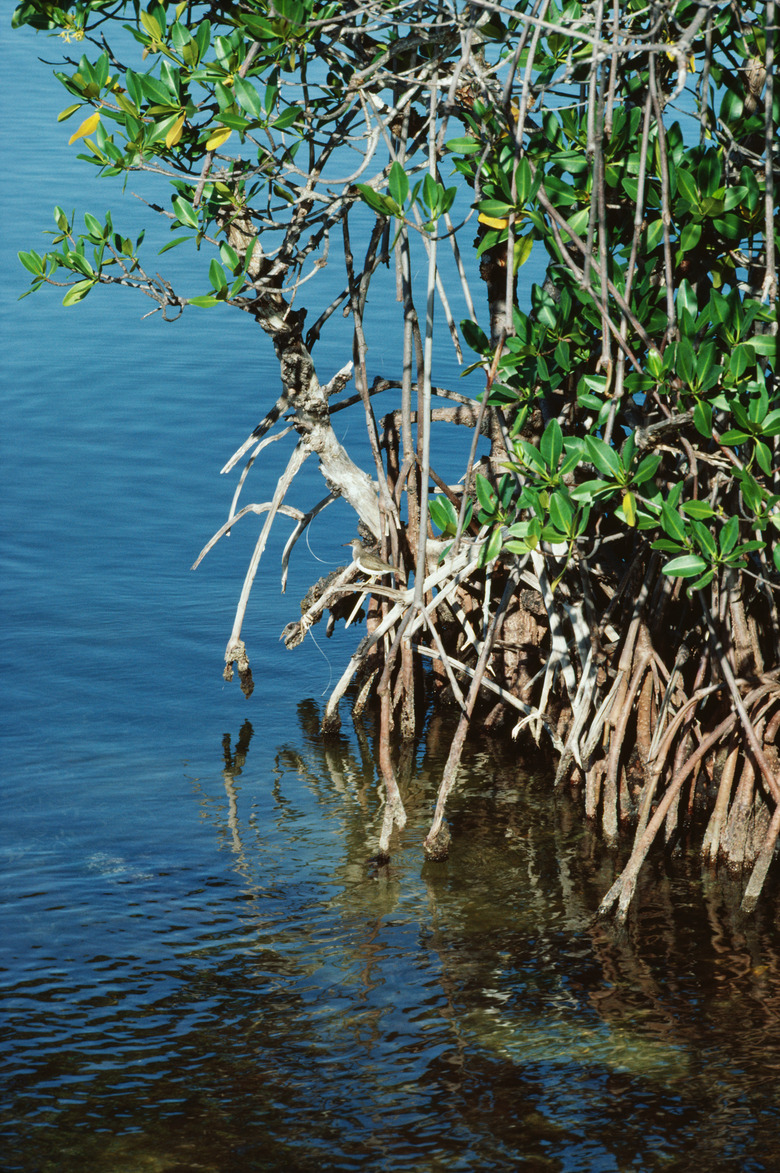The Role Of Decomposers In A Mangrove Ecosystem
In the hot, humid tropics you can find some of the most interesting life on the planet. In places where freshwater streams meet the salty ocean, there are masses of trees called mangroves wading into the water. They are propped up by tangled, gnarly roots that look like a giant bird's nest with a small, leafy green canopy above. These mangrove forests are not just stands of trees – they are entire ecosystems, complete with producers, consumers and tons of decomposers.
Primary Producers in Mangrove Ecosystems
Primary Producers in Mangrove Ecosystems
For an ecosystem to function properly, it needs producers, consumers and decomposers. The primary producers in mangrove ecosystems are the mangroves themselves. There are around 80 different species of mangroves worldwide, and they are all characterized as trees or shrubs that grow in warm, salty water. They are also important because they provide a habitat for other species that live in the ecosystem, like fish and birds.
Other important producers in these ecosystems are seagrasses, which coat the seafloor underneath the mangroves like a soft shag carpet. Together, the mangroves and seagrasses use photosynthesis to grow and provide energy for the rest of the ecosystem.
Decomposers Provide Nutrients
Decomposers Provide Nutrients
While producers tend to get a lot of credit for propping up ecosystems, mangrove forests wouldn't be able to operate without decomposers. As mangroves and seagrasses grow larger, they require more and more nutrients.
Nutrients like carbon, nitrogen and phosphorous are key to the health of plants. As long as those nutrients are there, the producers will do well. If one or more of those nutrients disappears, the producers, and by extension the whole ecosystem, is in trouble.
This is where decomposers come in. Between mangroves dropping their leaves in the water and fish dying, things can become a little messy. The good thing is that nothing goes to waste in these ecosystems.
Insects, like ants and beetles, will shred most of the leafy matter into tiny pieces with the help of protozoans and little crustaceans called amphipods. Once the deadfall has been chewed into fine pieces, bacteria, protozoans and microbes get to work breaking those particles into even smaller pieces. When this happens, nutrients that were locked up in the dead material are freed so the producers can use them again.
The Role of Predators in the System
The Role of Predators in the System
The primary producers in mangrove ecosystems would not be able to do their job without decomposers providing nutrients for them. The whole food chain passes energy to the plant eaters, or herbivores.
In mangroves, the creatures feeding on plants are often fish, insects or even decomposers (not much feeds on mangroves directly). As the fish are eaten by predators, their energy and nutrients become another link in the chain. Herons, larger fish and even crocodiles can act as predators in this system.
When those predators die, it is then up to the decomposers to hit the reset button on the food chain by harvesting nutrients that were passed from the producers to the consumers so they can be used again.
The Importance of Mangrove Ecosystems
The Importance of Mangrove Ecosystems
Mangrove ecosystems are some of the most productive in the world. They support many species of fish, amphibians, reptiles and other animals. Many of those fish species feed other species that visit the mangroves, in turn supporting whole communities. It's estimated that 75 percent to 90 percent of fisheries on the Florida coast are supported by mangroves.
Because of their coastal location and the tangled nature of their roots, mangrove forests also help protect shorelines from erosion while giving many rare species places to live. However, none of this would be possible without the lowly decomposers quietly recycling everything that comes their way.
Cite This Article
MLA
Brennan, John. "The Role Of Decomposers In A Mangrove Ecosystem" sciencing.com, https://www.sciencing.com/role-decomposers-mangrove-ecosystem-7411/. 30 September 2021.
APA
Brennan, John. (2021, September 30). The Role Of Decomposers In A Mangrove Ecosystem. sciencing.com. Retrieved from https://www.sciencing.com/role-decomposers-mangrove-ecosystem-7411/
Chicago
Brennan, John. The Role Of Decomposers In A Mangrove Ecosystem last modified August 30, 2022. https://www.sciencing.com/role-decomposers-mangrove-ecosystem-7411/
